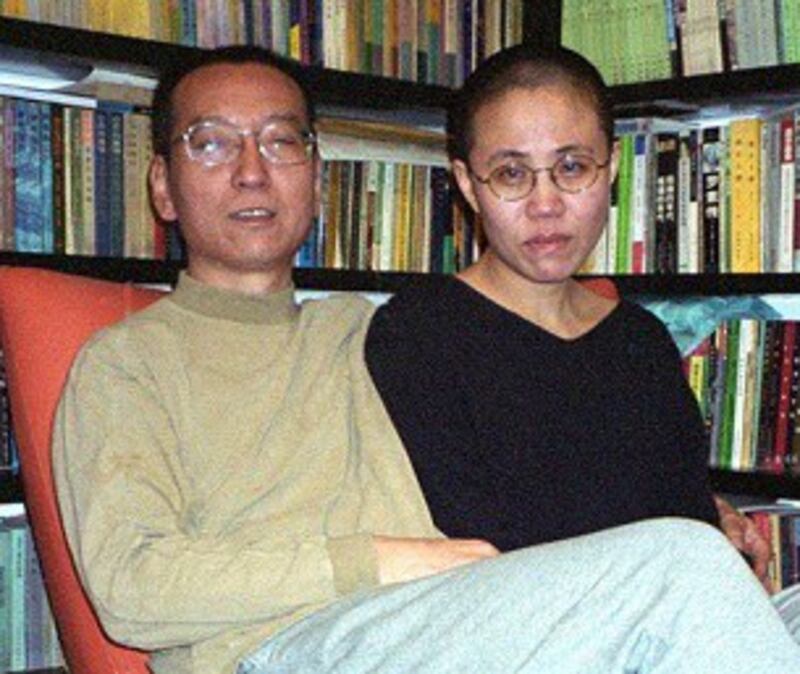UPDATED at 11:30 p.m. EST on 2012-12-4
More than 100 Nobel prize-winners have called on Chinese leader-in-waiting Xi Jinping to release jailed Nobel peace laureate Liu Xiaobo, and to free his wife Liu Xia from house arrest.
Winners of Nobel prizes for peace, but also for physics, chemistry, medicine, literature and economics, signed an open letter to Xi, who will be sworn in as China's new president in March, calling for the immediate and unconditional release of the couple.
"No government can restrict freedom of thought and association without having a negative effect on...important human innovation," said the letter, which was signed by Nobel peace laureates Archbishop Desmond Tutu and the Dalai Lama, as well as authors Mario Vargas Llosa and Toni
Morrison.
"Across all disciplines, the distinguishing feature which led to our recognition as Nobel Laureates is that we have embraced the power of our intellectual freedom and creative inspiration to do our part to advance the human condition," said the letter.
The international campaign to release Liu Xiaobo and Liu Xia is being led by Archbishop Tutu and medicine laureate Sir Richard Roberts, backed by the U.S.-based group Freedom Now, which acts as legal counsel to the couple internationally.
Tutu said in a statement issued alongside the letter: "Our effort is not to embarrass China but rather to implore the government to take a different approach that would help China develop in the best way for all its people."
Roberts added that Beijing could demonstrate by its response that it wasn't afraid to engage in a dialogue on human rights.
"By releasing Liu Xiaobo and Liu Xia, China can demonstrate its strength," he said.
Hu comments welcomed

The letter, which garnered a total of 134 signatures from Nobel laureates in all prize categories spanning four decades, welcomed recent comments by outgoing president Hu Jintao recognizing that there are some human rights issues in China.
"We hope that China’s new political leadership will move past merely recognizing the problem and seize this important opportunity to take concrete steps towards embracing the fundamental rights of all Chinese citizens," it said.
"An essential first step is the immediate and unconditional release of Dr. Liu Xiaobo and his wife Liu Xia," it said.
The letter, released by the International Committee for Liu Xiaobo, a group of six Nobel Peace Prize Laureates and 15 nongovernmental organizations, also took issue with Chinese government censorship of the Nobel Prize website, www.nobelprize.org.
Beijing reacted with fury over the 2010 award of the Nobel Peace Prize to Liu Xiaobo for his "long and non-violent struggle for human rights in China," placing Liu Xia under strict house arrest since the announcement in October 2010.
'Dragging feet'
Beijing-based activist and former Nobel Peace Prize nominee Hu Jia said he was excited to hear that so many influential people had signed the letter.
But he said that it would probably not be enough to secure the release of Liu and his wife.
"These are the cream of the elite, but the Chinese government will ignore or drag its feet on anything that doesn't constitute a security threat," said Hu, who was himself forced to leave the Chinese capital during the recent 18th Party Congress, and whose own family was kept under house arrest at his Beijing home for months.
He called on governments around the world, human rights groups, overseas Chinese and residents of China who support freedom of speech to join in calls for Liu Xiaobo and Liu Xia's release.
"Only then will the voices calling for Liu Xiaobo's release be loud enough," Hu said.
Empty chair
The ruling Chinese Communist Party censored news of the Nobel prize and the award ceremony in Oslo, when Liu’s medal and diploma were presented to an empty chair, an image that became a symbol for the dissident among his supporters online.
The writer, literary critic and former professor was detained in December 2008 after he helped draft Charter 08, a manifesto calling for sweeping changes in China's government that was signed by thousands of netizens.
A year later, he was sentenced to 11 years in jail for “inciting subversion of state power” in the charter and in six other articles published online.
In October, Chinese author Mo Yan, winner of this year's Nobel Prize for Literature, expressed the hope that Liu Xiaobo would be released from jail "very soon."
Mo's honor had previously met with a dismissive reaction from rights activists and dissident writers, while his achievement was widely lauded by state media.
However, Mo, himself a member of the Communist Party, didn't stray far from the official line on Liu, suggesting that he might be persuaded to change his political beliefs with the benefit of further study.
His remarks drew a lukewarm welcome from rights activists and friends of Liu Xiaobo.
Reported by Luisetta Mudie.
